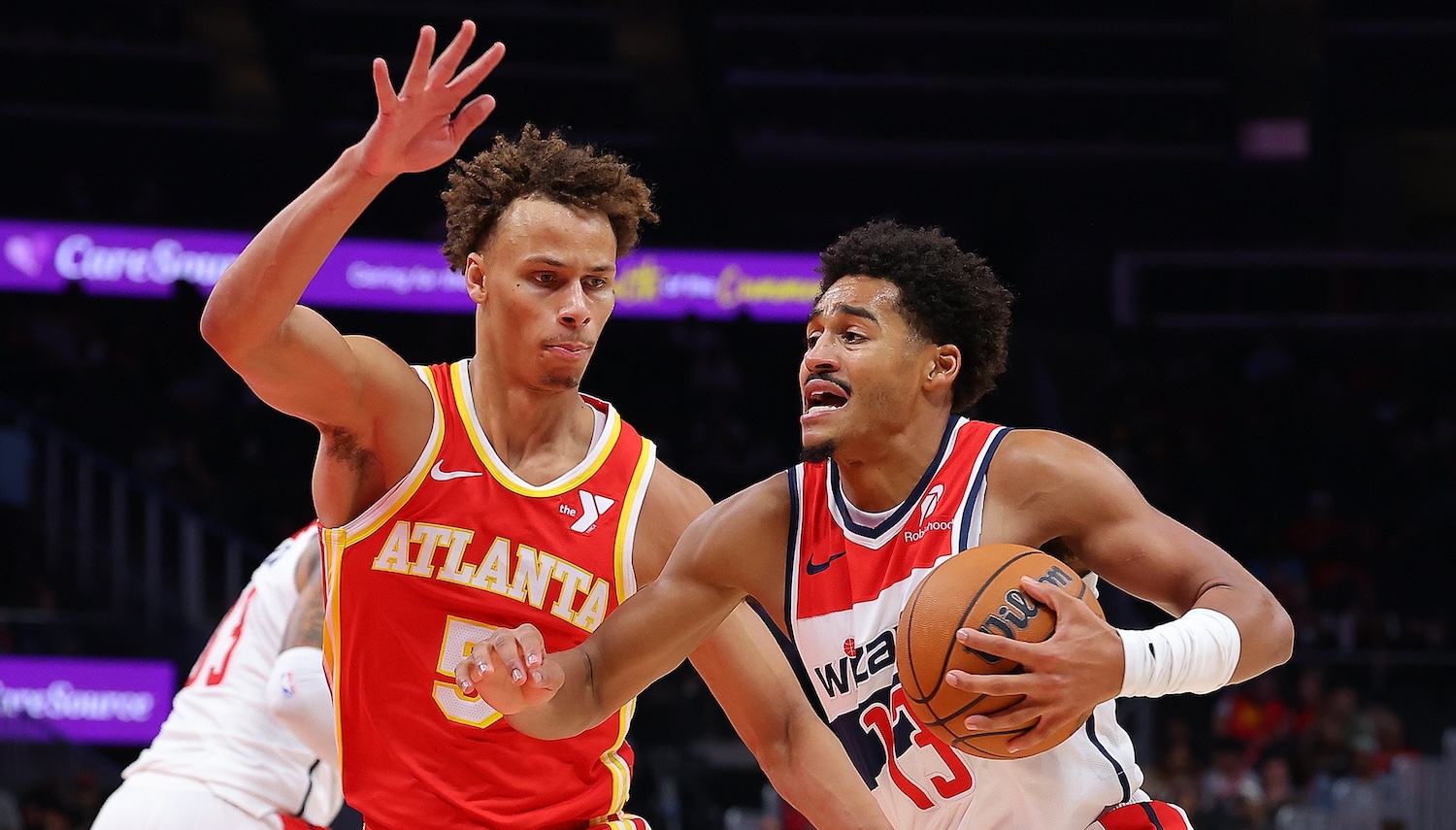I'm not much for nicknames, though occasionally a moniker so good emerges that it becomes the only way I can think about a player. Atlanta's Australian ballhawk Dyson Daniels has earned such a nickname: the Great Barrier Thief. In his first season with the Hawks, the 21-year-old Daniels is starting for the first time and, as such, is having a breakout season. It's always fun when a young, promising player is given their first chance at a big role, because all that newfound responsibility is a much stronger test of their abilities; there's so much talent in the league right now that surely each team has several players who could do more if given more opportunity. Daniels has shown, through 13 games with the Hawks, that he is one of the best defensive playmakers in the NBA.
Daniels is currently leading the league with 3.4 steals per game; his 91 deflections are a whopping 34 more than second-placed De'Aaron Fox. Daniels is averaging 4.7 steals every 100 possessions, the highest such figure since Nate McMillan, the guy who coached the Hawks for some of last season, did it in 1993–94 for the Seattle Supersonics, who don't exist anymore. Daniels recently put together an unholy four-game streak of six or more steals per game, and he has recorded a steal in every single game except for Monday night's win against the Fox's Sacramento Kings.
Don't ding him for that, however, as Daniels blocked four shots and sealed the game with a kinda-sorta foul, kinda-sorta block on the hottest player in the NBA, the aforementioned Fox, as the latter pulled up for an attempted game-winner.
What is impressive about Daniels's body of work this season is how comprehensive it is. He gets steals by back-tapping ball-handlers who get around him, by helping off the weak side and watching for the pass into the corner, by backing off a ball-handler the moment they commit to a pass and nabbing it easily, by waiting for a player in the post to take a breath before running in and grabbing it, by staying down and swiping instead of ever jumping at shooters, and by simply taking the rock from the opposing point guard. He described his process in blunt terms. "For me, you know, it's 'See ball, get ball,'" Daniels said after notching six steals in a win in Boston.
There's a tired strain of reactionary complaint about defense in the modern NBA, one that grumbles about how nobody is allowed to play it anymore. It's true that players can no longer hand-check each other on the perimeter, and that the spaced-out offenses that every team runs now make every defender more isolated, responsible for covering more ground, and therefore less often in a position to contest shots in the lane. Daniels, to me, is the NBA defender for this moment. The trick is that he is extremely aggressive in help defense. He stays in front of his man, but he knows exactly how much time and space he needs to leave himself to recover in help, and he uses that time and space to pursue the ball with force. If the complaint is that the invention of the three-point shot has obviated defense, Daniels offers a rejoinder: You can't shoot if you don't have the ball.
Daniels showed this ability with the New Orleans Pelicans, averaging 17 and 22 minutes off the bench in his first two NBA seasons. With a weird, misshapen roster full of vaguely flawed power forwards, the Pelicans couldn't afford to start anyone shooting 31 percent from three, so he primarily feasted on backup point guards. The theory of this past summer's Dejounte Murray trade, from the Pels' end, was that Murray could bring Daniels's level of first-line pressure while also being able to create and make a ton of shots. For the Hawks, Daniels was a younger, cheaper defense-first guard who was not a huge off-putting weirdo like Murray and would not demand the ball. On offense, Daniels does what every teammate of Trae Young has ever done and will probably do in perpetuity, which is stand on the perimeter while Young searches for either fouls, step-back opportunities, or lobs (in that order). That simple role suits Daniels, as he's not much of a creator, though he can attack shifting defenses pretty well.
The Hawks are as misshapen and strange as ever, the most spiritually .500 club in the league. Now that the Murray experiment is over, they have returned to playing a slightly retuned version of the aesthetically abhorrent, moderately effective brand of Traeball they've played for years, this time with a bit more emphasis on engineering lobs. Despite Daniels's excellent perimeter defense, they are 22nd in defensive rating.
Does that obviate his steals and deflections? No. Consider how much worse the Hawks would be without him. They are fifth in the East, with a 7-8 record, and Daniels is pretty clearly their third-best player. In other words, he's playing great defense on the best players in the NBA and it matters. He won't keep getting six steals per game, but he will keep trying, and he's so young that he can probably get better.






